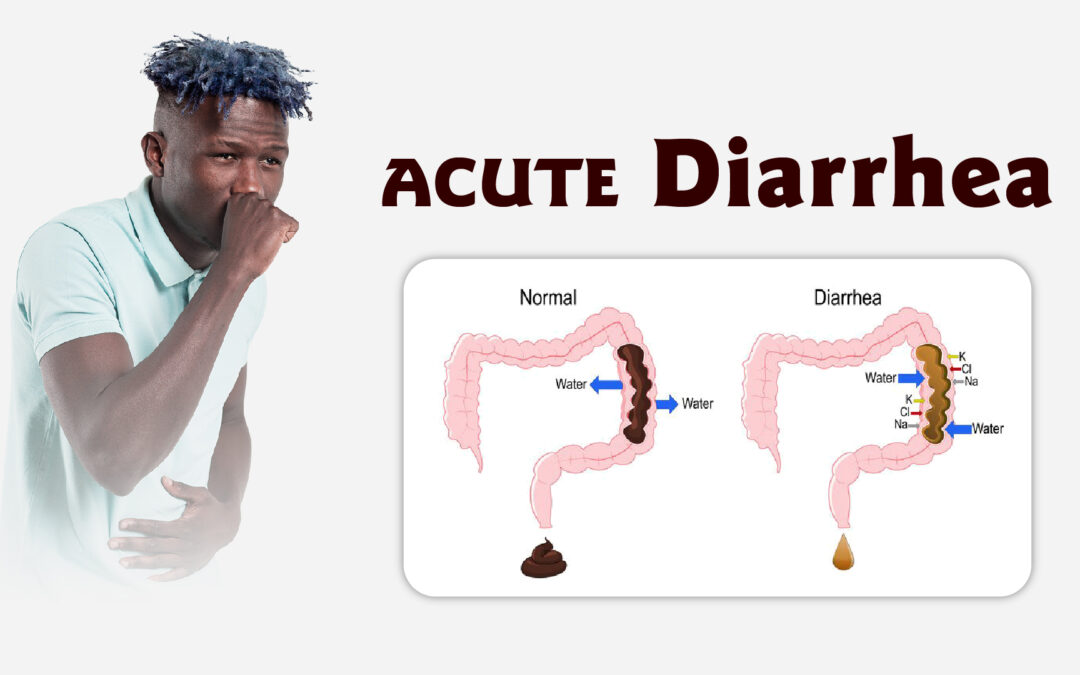Diarrhoea is a common illness. It may be Acute or Chronic.
Acute diarrhea is defined as the abrupt onset of 3 or more loose stools per day and lasts no longer than 14 days; chronic or persistent diarrhea is defined as an episode that lasts longer than 14 days.
Most healthy people open their bowels three times a day and sometimes three times a week. Normal stools are usually solid because the small intestine and colon are highly efficient in absorbing nutrients, fluid, and salts from the gut contents.
Diarrhoea occurs when these processes deteriorate, which can sometimes be when bacteria or viruses damage the lining of the gut. This results in excessive secretion of fluid such as water, into the bowel and this overwhelms the ability of the gut to reabsorb fluid and salts. The stools become loose and watery and more frequent bowel movements occur.
Diarrhoea is also a symptom of some diseases of the digestive tract. Acute diarrhoea is usually short lasting and the symptoms come on suddenly but usually clear up within five to 10 days; anything longer than that (about 4 weeks) is chronic diarrhoea which needs the special attention of a physician. Acute diarrhoea is sometimes accompanied by other symptoms such as nausea, vomiting, abdominal pain, or weight loss.
It can be caused by:
- Food poisoning: this is one of the most common causes of acute diarrhoea. It is usually caused by Salmonella and Campylobacter bacteria. It can be passed through contaminated food such as poultry and eggs, meat, ground beef, seafood, vegetables and porks or by someone who has the infection but showing no symptoms yet.
- Contaminated Water is a major reservoir for many organisms that cause diarrhea. Swimming pools have been associated with outbreaks of infection with Shigella species.
- Intestinal infection: this is also known as gastroenteritis. It is the most common cause of acute diarrhoea in infants and young children who are susceptible.
- Medications: acute diarrhoea can occur after taking antibiotics or other medications that cause the bowel to move too rapidly through the gut leaving insufficient time for absorption.
- Anxiety: this can cause the bowel contents to move too rapidly through the gut with insufficient time for absorption.
- Irritable bowel syndrome (IBS): IBS is a functional gastrointestinal condition where the large bowel is moving too fast and this doesn’t allow enough time for the absorption of fluid and salts, causing diarrhoea.
- Food intolerance: The main culprit for diarrhoea symptoms due to food intolerance is lactose intolerance. It is caused by a reduction in levels of lactase, an enzyme produced in the small bowel that helps digest lactose, the sugar found in milk.
- Bowel cancer: diarrhoea is a common symptom, however, a prolonged change in bowel habit lasting more than two or three months should always be investigated. A person with a family history of bowel cancer should visit a doctor within a few weeks of any
- Other Conditions like Cealiac Disease and Bile acid malabsorption (BAM).
- Surgery: Any removal of significant parts of the digestive tract can result in diarrhoea.
DIAGNOSIS
Fecal samples are collected and laboratory studies carried out which include the following:
- Examination for ova and parasites
- Leukocyte count in Full Blood Count test
- pH level: A pH level of 5.5 or less or the presence of reducing substances indicates carbohydrate intolerance, which is usually secondary to viral illness.
- Cultures: Always culture for Salmonella, Shigella, and Campylobacter spp and Diagnosis
TREATMENT
Although most episodes of acute diarrhoea will settle within a few days without any intervention, however, if the episode is severe here are some treatments that can help:
- Rehydration:Enough additional fluids and salts are taken to replace those lost in the diarrhoea. A pre-prepared oral rehydration solution (ORS) can be used for infants, young children, and the lederly, who are more sensitive to fluid losses. ORS can be purchased over the counter in most pharmacies. For most adults, they can simply increase fluid intake in the form of mineral water, fruit juices (containing potassium), and soups (containing sodium), with some form of carbohydrate (rice, pasta, salty crackers), which is important for promoting fluid and salt absorption.
- Food intake: There is no need to interrupt breastfeeding for breastfed Bottle-fed infants can still receive full-strength formula milk. Adults may need to avoid dairy products and spicy foods for a short time during the initial phase of illness until the foods are well tolerated again. Any problems in tolerating dairy products long-term need to be reported to your doctor.
- Medication:an anti-diarrhoea drug such as loperamide is available from pharmacies without a prescription and is helpful early in the illness to reduce bowel frequency. However, it should not be used in infants and very young children because it may depress respiration.
- Antibiotics: travellers with severe diarrhoea can use antibiotics to reduce the severity and duration of the illness.
PREVENTION OF ACUTE DIARRHOEA
Handwashing
One of the most important ways to avoid it is by careful hand washing after using the bathroom and before consuming food because most acute diarrhoea is related to intestinal infection and is usually transmitted by contaminated food or water. The hand should be washed with soap and water or an alcohol-based hand gel should be used when soap and water are not available.
Adjustment of fluid or Food intake
Acute diarrhoea can be also avoided by being meticulously careful about food and fluid intake. Only drink bottled or boiled water, and ice cubes should be avoided when the origin of the water is uncertain.
Raw, unpeeled fruits and salads, shellfish, and all foods that might contain raw eggs should be avoided. The safest food is hot and well-cooked foods.
REFERENCE
Acute Diarrhea – What You Need to Know (drugs.com)
Diarrhoea | Causes, Symptoms, Treatment & Support | Guts UK (gutscharity.org.uk)

